Video Description
Hepatitis B is a viral infection that inflames the liver. If left untreated, it can cause chronic liver disease, cirrhosis, and even liver cancer. Helicobacter pylori is a common bacterial infection that damages the stomach lining. It is a leading cause of gastric cancer and peptic ulcers. Both are treatable infectious diseases, and early awareness can save lives.
In this video, Dr Lim Lee Guan explains the difference between acute and chronic Hepatitis B. He shows how the virus spreads through blood and body fluids. You’ll also learn why Hepatitis B vaccination is vital, and how it has reduced infection rates worldwide. The talk highlights mother-to-child transmission during childbirth, the high prevalence in Asia and Singapore, and the risks of being a silent carrier.
The session also covers Helicobacter pylori infection. This bacteria can hide in the stomach for years without symptoms. Over time, it raises the risk of gastric cancer and lymphoma. Dr Lim explains how H. pylori spreads within families, why early testing matters, and how eradication therapy works. He also describes diagnostic methods — from breath and stool tests to endoscopy and biopsy — and outlines current treatment options.
By the end of this video, you’ll understand how Hepatitis B and Helicobacter pylori increase cancer risks. You’ll also know how prevention, vaccination, and proper treatment can protect liver and stomach health.
👉 Watch this video to know more about Hepatitis B and Helicobacter pylori. Learn their symptoms, risks, prevention, and treatment options — and take steps to safeguard your health. PRIME












Leave A Comment